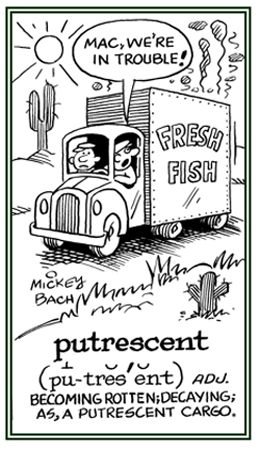putre-, putri-, putid- +
(Latin: rotten, decayed; to be rotten, to become rotten, to decay)
2. Counteracting, or preserving from, putrefaction; an antiseptic.
Could this apply to other areas; such as, athletes, writers, entertainers, love affairs, business enterprises, the stock market, and popularity?
2. The decomposition of organic matter; especially, the typically anaerobic splitting of protein by bacteria and fungi with the formation of foul-smelling and poisonous products; such as the ptomaines, mercaptans, and hydrogen sulfide.
Putrefaction is a complex phenomenon involving a multiplicity of chemical reactions, always accompanied by, and without doubt caused by, bacteria and vibriones; hence, putrefaction is a form of fermentation, and is sometimes called putrefaction fermentative.
Putrefaction is not possible under conditions that preclude the development of living organisms. Many of the products of putrefaction are powerful poisons, and are called cadaveric poisons, or ptomaines.
2. Causing or tending to promote putrefaction or decay.
2. To undergo putrefaction or decomposition.
3. To be broken down by bacterial action and so, to decay, producing a strong, unpleasant smell.
2. In a state of progressive putrefaction; decay, corruption, rottenness.
2. Etymology: from Latin putrescentem; from putrescere, "to grow rotten" from putrere, "to be rotten."

Go to this Word A Day Revisited Index
so you can see more of Mickey Bach's cartoons.
Word families with similar applications about: "decay, rotten; wasting away; putrid, pus" word units: phthisio- (decay, waste away); puro- (pus); pus (viscous fluid via an infection); pustu- (blister, pimple); pyo- (pus; purulent); sapro- (rotten, putrid, putrefaction, decay); sepsi- (decay, rot, putrefactive); suppurant- (festering, forming or discharging pus); tabe- (wasting away, decaying).

